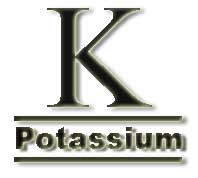



| CAUSES OF HYP0KALEMIA Low Potassium |
| Diuretics |
| • The most common cause of
hypokalemia is diuretic therapy. It is the most widely used antihypertensive
medication, decreasing blood pressure through decrease of plasma volume
by suppressing tubular reabsorption of sodium, and with chronic use, causes
a reduction of peripheral vascular resistance. • Of the diuretics, the thiazides are the most widely used. • Used alone, diuretics control blood pressure in about 50% of patients and can be effectively combined with other agents - beta-blockers ,ACE inhibitors, angiotension II blockers. • Low potassium can be minimized or prevented by use of the diuretics in the lowest effective, a high potassium diet, limited salt intake or use of potassium-sparing diuretics, alone or in combination with thiazides. • Caution: Diuretics may increase uric acid and precipitate gout. |
| Gastrointestinal loss |
| • Vomiting, diarrhea. • Chronic laxative abuse. |
| Others |
• Antifuncal Amphotericin
B. |
| DAILY POTASSIUM NEEDS |
A panel from the Institute of Medicine's Food and Nutrition Board has set the daily adequate intake of potassium for healthy adults at 4.7 g per day to lower blood pressure, counter the effects of salt, and reduce the risk of bone loss and development of kidney stones. The amount corresponds to 10 servings of fruits, vegetables and other foods rich in potassium. Most American women aged 31-50 years consume no more than half the recommended amount of potassium, 2.2 to 2.4 g of potassium daily; and men's only slightly higher, 2.8-3.3 g daily. CAUTION |
| SELECTED FOODS WITH HIGH POTASSIUM CONTENT |
||
| Very High (12-20 meq) | High (5-12 meq) | |
| Beans |
Garbanzo beans (half cup) Soy beans (half cup) |
Kidney beans Lima beans Navy beans Pinto beans |
| Fruit |
Papaya (medium) Durian |
Apricots (1 1/2) Banana (medium) Cantaloupe (1/4 inch slice) Honeydew melon (1/4 inch slice) Orange (3 inch diameter) Orange Juice (half cup) Pear (large) Prunes (4) Prune juice Rhubarb |
| Vegetables |
Artichoke (one) Avocado (1/4) Brussels sprouts Carrots (medium) Chard Ketchup (tbsp) Potato - one, baked or broiled; 10 fries, or half cup mashed Pumpkin Spinach Tomato (one) Tomato or vegetable juice |
|
| BOOST POTASSIUM INTAKE TO CUT STROKE BY 20% |
The largest meta-analysis so far conducted examining the impact of potassium intake on cardiovascular outcomes has found that higher dietary consumption of this mineral is associated with lower rates of stroke and could also reduce the risk of coronary heart disease (CHD) and total CVD. The senior author of this new research, Dr Pasquale Strazzullo (University of Naples Medical School, Italy) advises that rather than confuse patients with too much detail on nutrients and supplements, the simple advice woud be to eat more fruits and vegetables, particularli those that are very rich in potassium--including bananas, tomatoes, oranges, apricots, and most legumes. The most practical advice we can give is that people should have five or six servings of fruit and vegetables a day," he says. Alas, many doctors are not aware of what huge benefits one might derive from this measure. |
| SOURCES |
| USDA Handbooks No. 456, 8-1 and 8-9 |
| Panel Reassesses Daily Water, Electrolyte Needs Patrice Norton, Contributing Writer. Internal Medicine News. April 1, 2004 |
| Herb-drug Interactions R. Bonakdar MD., Patient Care/January 2003 (www.patientcareonline.com) |
| Hyperkalemia CURRENT Diagnosis & Treatment, 35th Edition, aLange medical book |
| Boost Potassium Intake to Cut Stroke by 20% Heartwire / |